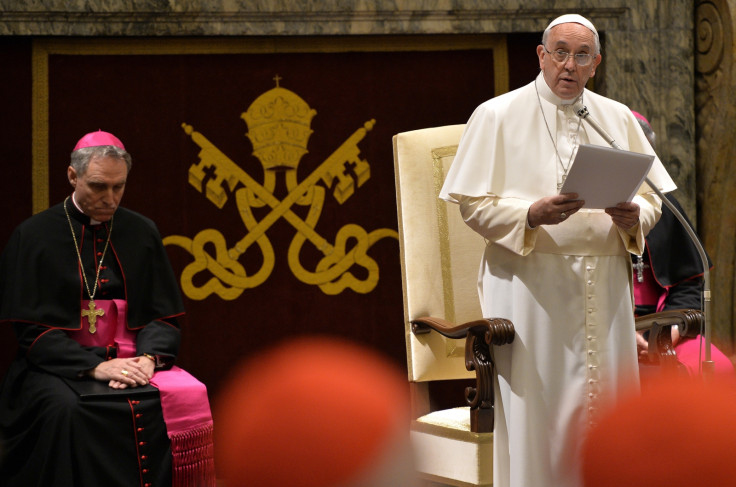Pope Francis denounces Vatican's 'fruit of hypocrisy' and cowardly 'terrorism of gossip'

Working too hard, committing the "terrorism of gossip" and having a funereal face are three of 15 "ailments" of the Vatican Curia criticised by Pope Francis in his annual Christmas greetings to the cardinals bishops and priests.
Urging reforms to the governance of the Catholic Church, the Argentine pontiff listed what he believes are the most compelling issues he will work to resolve in the new year.
Here is the list of the 15 ailments identified by the Pope:
1) Feeling immortal or indispensable. "A Curia that doesn't criticise itself, that doesn't update itself, that doesn't seek to improve itself is a sick body," Francis said, suggesting those who suffer from this illness go and visit a cemetery as a reminder of what has become of many who believed they were powerful and immortal.
2) Working too hard. "Rest for those who have done their work is necessary, good and should be taken seriously," he said. "Neglecting the necessary rest causes stress and anxiety."
3) Becoming spiritually and mentally hardened. "It's dangerous to lose that human sensibility that lets you cry with those who are crying, and celebrate those who are joyful," Francis said.
4) Planning too much. "Preparing things well is necessary, but don't fall into the temptation of trying to close or direct the freedom of the Holy Spirit, which is bigger and more generous than any human plan," Francis said.
5) Working without coordination. Francis told the curia that individualism turns the church in an orchestra that produces noise: "When the foot tells the hand, 'I don't need you' or the hand tells the head 'I'm in charge'."
6) Having "spiritual Alzheimer's". Francis said those affected "have forgotten their encounter with the Lord... in those who depend completely on their here and now, on their passions, whims and manias, in those who build walls around themselves and become enslaved to the idols that they have built with their own hands".
7) Being rivals or boastful. The pontiff said this illness symptoms can be detected "when appearances, the colour of garments and honorific titles become the primary objective of life".
8) Suffering from "existential schizophrenia". Francis used this metaphor to slam the Vatican's bureaucracy.
"It's the sickness of those who live a double life, fruit of hypocrisy that is typical of mediocre and progressive spiritual emptiness that academic degrees cannot fill. It's a sickness that often affects those who, abandoning pastoral service, limit themselves to bureaucratic work, losing contact with reality and concrete people," he said.
9) Committing the "terrorism of gossip". "It's the sickness of cowardly people who, not having the courage to speak directly, talk behind people's backs," he said.
10) Glorifying bosses. Those affected are hard-line careerists and opportunists, according to the Pope.
"It's the sickness of those who court their superiors, hoping for their benevolence," he said. "They honour people who aren't God."
11) Being indifferent to others. This occurs when "one thinks only about himself and loses the truthfulness and the warmth of human relations," Francis said. "When, out of jealousy or cunning, one finds joy in seeing another fall rather than helping him up and encouraging him."
12) Having a "funereal face". "In reality, theatrical severity and sterile pessimism are often symptoms of fear and insecurity. The apostle must be polite, serene, enthusiastic and happy and transmit joy wherever he goes," Francis said.
13) Wanting more. "When the apostle tries to fill an existential emptiness in his heart by accumulating material goods, not because he needs them but because they male him feel more secure."
14) Forming "closed circles". Francis seemingly used this "aliment" to criticise factions and small groups inside the Curia. "This sickness always starts with good intentions but as time goes by, it enslaves its members by becoming a cancer that threatens the harmony of the body and causes so much bad — scandals — especially to our younger brothers," he said.
15) Seeking worldly profit and showing off.
"It's the sickness of those who insatiably try to multiply their powers and to do so are capable of calumny, defamation and discrediting others, even in newspapers and magazines, naturally to show themselves as being more capable than others," Francis concluded.
© Copyright IBTimes 2024. All rights reserved.






